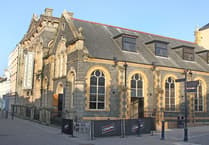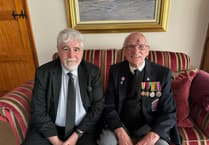THE latest community news from Aberystwyth
Esperanto Conference,/b>
THE 99th British and third Pan-Celtic Esperanto Conference combined will take place at The Morlan Centre from Friday, 13 April to Tuesday, 17 April.
The event will bring together 60 Esperanto speakers from eight countries.
Guest speaker, Prof Paul Birt, is acting chair of Celtic Studies and Visiting Prof at the University of Ottawa, Canada. He will present two talks in Esperanto, opening with the question of whether the plan to create a million Welsh speakers in Wales by 2050 is a realistic aim or a fantasy. His second presentation looks at the re-emergence of Cornish after its disappearance and asks whether we can consider it to be successfully brought back to life.
Ten Breton speakers of Esperanto will be present, and their contribution includes an introduction to Breton folk music. The Scottish contribution will include a talk on the mysterious Picts.
The evenings will include a performance of Welsh music by Bois y Fro, and some “Esperanto’s got talent” sessions.
There will be guided visits to different parts of Ceredigion as a way of showing this part of Wales to visitors from overseas in particular.
For details go to https://britakongreso.org/en/ or contact Tim Owen on 0773 7410480.
Bone Marrow Donor Registry
CHILLING out on bean bags, eating popcorn, watching a film and potentially saving a life? Not activities you’d normally put together, but that’s what the Welsh Blood Service asked hundreds of Aberystwyth University students to do this week, by joining their Welsh Bone Marrow Donor Registry (WBMDR).
On the opening day alone, 25 students from Aberystwyth University signed up to join the register, and potentially donate life-saving bone marrow, as part of the ‘#ChilledOutLifesaver’ campaign which sees a series of pop up ‘chill-out’ zones visiting universities across the country. Its aim is to encourage people aged 17-30 to join the Welsh Bone Marrow Donor Registry (WBMDR) and if called upon, see for themselves how it’s a chilled-out way to save a life.
People who joined the bone marrow register relaxed in front of a movie, read a magazine, ate some popcorn and learned more about how they can help before giving blood. One of the latest members of the bone marrow register Mya Osboure, 22 years old, currently studying Zoo-ology at Aberystwyth said: “I’ve got a grandparent who’s been going through breast cancer, my mums been unwell and I was born premature so underwent various operations, it’s always in my mind that if you’ve got it, then give it.
“I’ve donated blood twice here but didn’t decide to join the [register] previous times because the procedure sounded scary, but now I know a little more I figured that I’d sign up and hopefully I can help someone in need.”
The WBMDR is a register of blood donors who have volunteered to become bone marrow or peripheral blood stem cell donors. The register is searched every day by clinicians from across the world who are trying to find donors whose tissue type is a close match to patients who need lifesaving bone marrow or peripheral blood stem cell transplants.
The Welsh Blood Service’s #ChilledOutLifesaver campaign playfully contrasts the complexity of ‘traditionally’ saving a life, with the simplicity of becoming a bone marrow donor, which starts with sitting back and giving an extra blood sample at a blood donation session.
Emma Cook, head of the Welsh Bone Marrow Registry, said: “Becoming a bone marrow donor is so much easier than most people think and just requires providing an extra sample of blood at your next donation.
“By targeting people aged 17-30, we will have the best chance of creating a larger pool of people we could call on to help save as many lives as possible.
“Students are stereotypically extremely chilled out, so we wanted to use this insight to create a fresh, modern campaign that young people can relate to.
“Only 30 per cent of patients in need of a life changing donation can find a suitable match within their own family, so it’s common to rely on the kindness of strangers. As a bone marrow transplant is often the last resort it’s so important to ensure we have people on the register ready to donate.”
There are a number of blood donation clinics scheduled across Wales over the coming weeks where donors can start their #ChilledOutLifesaver journey.
Simply book an appointment to give blood and ask to join the bone marrow register before you donate. For more information visit welsh-blood.org.uk or calling the Welsh Blood Service on 0800 252266.
Mapio Cymru
A PROJECT to create a fully Welsh language map of Wales visited Aberystwyth last week.
The Open Data Institute Cardiff are currently working on the initiative to populate the map of Wales with its original, Welsh language names. The Mapio Cymru project is part of legacy programme under the Cymraeg2050 project sponsored by the Welsh Government.
The project is encouraging people from across Wales to input the data for their own community on the map, with the hope the map will be used for various functions, including the development of a fully Welsh language sat nav system to allow Welsh speakers to use mapping technology in their own language.
Project organisers held an event at Yr Hen Lew Du pub in Bridge Street, Aberystwyth, on Tuesday.
The project has been supported by a £19,900 grant from the Welsh Government’s Cymraeg2050 fund which promotes Welsh in the community and Welsh language technology.
Minister for the Welsh language and lifelong learning, Eluned Morgan said: “We want the use of Welsh to be a routine part of everyday life so that speakers at all levels feel confident in using it in formal and informal situations.
“Displaying Welsh place names will allow Welsh speakers to use mapping technology in their own language and to embed a map with Welsh place names and events like concerts, fund-raisers, etc. on their own website.
“Mapio Cymru is one of many Cymraeg2050 projects that will make it easier for people to use the language, whether face to face in the community and in the workplace or through digital platforms.”
The new map of Cymru can now be seen online and added to at openstreetmap.cymru.
Rotary Club
THIS WEEK’S speaker was Dafydd Evans, who, as a recently joined member, gave his Job Talk by way of introduction to the club.
Born, brought up and now living in Penllwyn, Capel Bangor, Dafydd is a true local and counts himself fortunate to have been able to spend his working life in the area, something denied to so many young people.
After gaining his City and Guilds qualification in Cardiff, he took up his first post as a radio and TV technician in Walker’s in Aberystwyth. This was an age where it was normal to repair electronic equipment rather than bin it and buy new. He remembers very well the video format war between VHS and Betamax and the cost of early VHS machines, £3,000 in today’s terms. Excellent quality service was essential in those days to ensuring customer loyalty.
He moved from Walker’s to work as a laboratory technician in the physics department at the university in Aberystwyth and from there to the audio visual unit where he worked with past president Mike Price providing AV teaching support and producing recruitment videos for the iniversity.
In the early 1990s he was also involved in the establishment of the University of Wales video conferencing system, linking HE institutions across Wales, a significant innovation at the time.
From there he moved to the National Library to work on the creation of the Wales National Screen and Sound Archive as a means of increasing public awareness of and access to NLW’s extensive resources in film and television.
A particular challenge has been the need to migrate material between different formats to maintain its continued accessibility in modern electronic formats as systems become obsolete within comparatively short periods.
At the same time, original film and television material is safely and securely stored in an NLW vault. In this context he has contributed much to the creation of the Wales Video Gallery and the ITV Wales Collection, the latter dating back to the 1960s, where the deterioration of video tapes has required a major conservation effort.
President Martin thanked Dafydd for his interesting talk, delivered with much warmth and sincerity, and mentioned a number of specific projects where Dafydd’s skills and contacts have already proved very helpful in promoting awareness of the activities of Rotary.
Hay Scribblers
HAY Festival Scribblers Tour returns to Aberystwyth University this month (Friday, 23 March) for a free day of events delivered entirely in Welsh, bringing acclaimed writers direct to Welsh language and bilingual Key Stage 3 pupils (Years 7, 8 and 9).
Hay Festival Welsh Language Scribblers Tour aims to engage and encourage the next generation in creative writing, poetry and conversation, inspiring empathy and creativity. The tour also gives pupils a chance to visit university and experience a taste of life on campus.
Acclaimed writer and broadcaster Jon Gower will compère the day of events, introducing readings and performances from Aneirin Karadog, Rufus Mufasa and Kevs Ford; plus an afternoon of creative writing workshops that will also feature writer Clare Potter and poets Eurig Salisbury and Hwyel Griffiths.
Choral Society
DURING the break in last Tuesday evening’s choir practice, chairman June Williams took the opportunity to announce to choristers that the harpist, arranger and composer, Catrin Finch, had very kindly agreed to become the society’s president in succession to Daryl Griffiths, who passed away last year.
Becoming president continues Catrin’s association with the society as her mother was a member some years ago and Catrin, before she went to university, sang in the choir and also assisted occasionally as accompanist.
The main work for the Spring Concert on Saturday, 28 April, is the very tuneful Dvorak Stabat Mater, and rehearsals for this are going very well indeed. Conductor David Russell Hulme recently announced that the second work to be sung, will be Vaughan Williams’ Serenade to Music. This was written by Vaughan Williams as a tribute to the conductor Sir Henry Wood to mark the 50th anniversary of his first concert. The choir will be singing the arrangement for four soloists, choir and orchestra.
The staging of two major concerts each year with professional conductor, soloists and orchestra does not come cheap and the society is holding a fund-raising coffee morning with stalls in the Waunfawr Community Hall from 10.30am to noon on Saturday, 17 March. All are welcome.
NHS Retirement Fellowship
AFTER Christmas, members gathered at the Richmond Hotel for their New Year’s lunch on a particularly sunny day where they enjoyed an excellent meal.
The guest speaker on 12 February was David Poole, on his experiences as a police dog handler.
His interest in dogs came at an early age as his father bred racing greyhounds. In 1970 he joined Warwickshire police force and worked within the force as a handler and instructor. Of the beautiful photographs he brought along, four German Shepherds featured predominantly, being the dogs he had personally trained and instructed whilst in the force.
The breed was particularly noticed in the First World War by British Tommies in France where the Germans were using them. Originating from Alsace, the German Shepherd dog is its acknowledged name. Its capabilities were compared with a number of other breeds for observance, a challenging disposition, finding items bearing scent, agility, fitness and tracking suspects. In all, it proved the best all-rounder.
However, foreign lorry cabs are too high off the ground for German Shepherd dogs to leap into so specialist smaller search/sniffer dogs are then deployed.
Training commences when they are 12 to 15 months old. Once they have proved successful in fetching and bringing back items at the Police Dog Centre, they are considered suitable for drug work.
Many eager questions were answered by Mr Poole and it was revealed that only one, of all members present, had not owned a dog.
Dianne Bishton gave the vote of thanks for a delightful talk.
The next meeting at the Waunfawr Community Hall will be on Monday, 14 March, when they look forward to Roger Bray’s talk ‘Green Aberystwyth’.
U3A
ON Thursday, 15 February, at the Morlan Centre Penny David gave a talk titled ‘Tales from the Herb beds’.
Penny now lives in Lampeter and her distinguished career history includes a degree in modern history at Oxford and she has published several books on the subject of gardening and gardening history.
Penny’s passion for gardening took her to Llanerchaeron as a volunteer where she looks after the herb garden.
Penny described the learning curve she has experienced in looking after the herbal garden and reminded the very interested audience of the origin of some of the modern medicines. There was also an emphasis on the risk, without knowledge, of combining modern medication with herbal remedies.
Included in the talk were explanations into the usage of some of the herbs e.g. how sorrel can be used to clean silver and the use of sweet grounded Sicily seed in the past as a sweetener for pie fruit.
Many questions were asked by members and guests, followed by refreshments.
The next meeting on 15 March, at 2pm in the Morlan Centre, will be the AGM followed by a quiz.
If you’re a member of a club, society or group, send your news to [email protected]





Comments
This article has no comments yet. Be the first to leave a comment.